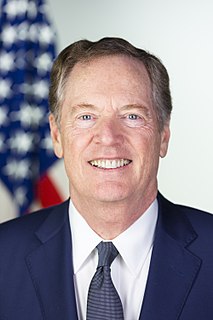A Quote by Barry Gardiner
Related Quotes
Regime change has been an American policy under the Clinton administration, and it is the current policy. I support the policy. But regime change in and of itself is not sufficient justification for going to war--particularly unilaterally--unless regime change is the only way to disarm Iraq of the weapons of mass destruction pursuant to the United Nations resolution.
We have to fundamentally rethink our trade policy and make it work not for the CEOs of large corporations, but for working people. So, if Trump wants to develop a rational trade policy which demands corporations start investing in this country, rather than China, that's something that we can work on.
Hillary Clinton's position on policy on markets and trade is very plain, which is we'll do trade deals but only if they meet three criteria, increase American jobs and wages and are they good for national security. If they are and if we can enforce them, then trade deals are okay. If not, we can't embrace them.
































